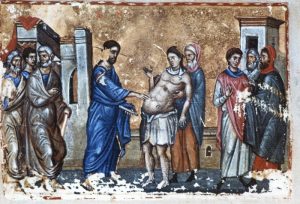Ord Om ordet
Liminal Encounter
One sabbath when he went to dine at the house of a ruler who belonged to the Pharisees, they were watching him. And behold, there was a man before him who had dropsy. And Jesus spoke to the lawyers and Pharisees, saying, ‘Is it lawful to heal on the sabbath, or not?’ But they were silent. Then he took him and healed him, and let him go. And he said to them, ‘Which of you, having a son or an ox that has fallen into a well, will not immediately pull him out on a sabbath day?’ And they could not reply to this. Luke 14.1-6.
There is incongruity in this account.
Jesus is invited out on a sabbath. The setting is formal, a society dinner: his host is a ‘leading Pharisee’. The atmosphere is tense. All watch him closely, curious to hear his singular teaching, no doubt; but also set on ‘catching him out’, as the Pharisees do, more and more, as the Gospel plot thickens.
Then we are told there was ‘in front of him a man with dropsy’, his limbs painfully swollen by trapped fluid. A smart scholar would surely not have included such an inelegant personage in his seating plan; furthermore, the abrupt ‘in front of him’ suggests the sick man’s appearance as an obstacle. It seems most likely he approached Jesus at the entrance to the house, blocking his entry, seeking attention first.
It is an encounter ad limina, then, taking place on the threshold between two worlds: that of the ailing riffraff of the streets and that of contemplative academe. Jesus brings the two together by means of a question. He asks the Pharisee & Co: ‘How does your learning, so sublime, engage with this affliction, this impurity?’
They have no answer.
Faith, ‘the assurance of things hoped for, the conviction of things not seen’ (Heb 11.1) is tested by the visible and palpable, by what, and whom, we find in front of us.
What is concrete does not cancel out what is spiritual, but calls for it to be embodied, that the two may become one. Obstacles impeding our entry to the sanctuary of contemplation are not always an affliction; they may just be a summons not to think ourselves more sublime than God, who took flesh entirely, drinking the cup of the human condition to the dregs, tasting both its exhilaration and its bitterness.
After his dinner at the Pharisee’s house, Jesus told the crowds: ‘whoever of you does not renounce all he has cannot be my disciple’ (Lk 14.33).
The ‘all’ includes our certainty of having the totality of answers before life has finished putting its questions to us.

Miracle of the man suffering from dropsy, Mount Athos, Iviron monastery, MS. 5, fol. 299v.
